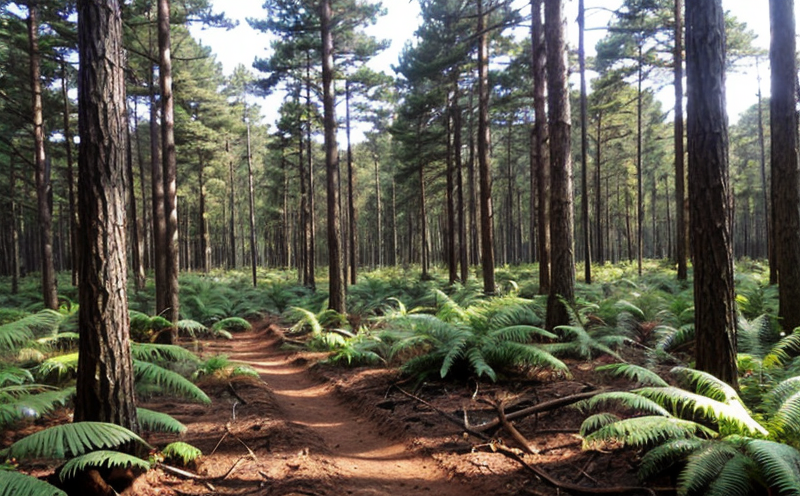Soil Bulk Density Measurement
The measurement of soil bulk density is a fundamental practice in agriculture and forestry testing. It involves determining the mass of dry soil per unit volume including both solid particles and pores filled with air or water. This parameter is crucial for understanding the physical properties of soil, which directly impacts plant growth, nutrient availability, and overall ecosystem health.
In agricultural settings, accurate measurement of bulk density helps in optimizing fertilization practices, irrigation schedules, and tillage operations. In forestry, it aids in assessing forest floor composition, root zone conditions, and overall forest productivity. The technique is also vital for environmental studies where the impact of land use changes on soil structure needs to be quantified.
The standard method for measuring soil bulk density involves collecting a representative soil sample from various points within the designated area. Care must be taken to ensure that the samples are not contaminated with external materials, which can lead to inaccurate readings. Typically, cylindrical cores or shovels are used to collect these samples at a specified depth.
The collected samples are then oven-dried at a temperature of 105°C until constant weight is achieved, ensuring all moisture content has been removed. The dry sample is weighed on an accurate balance and the volume is calculated using geometric methods or by water displacement for irregularly shaped samples. Dividing the mass of the dried soil by its measured volume yields the bulk density.
For large-scale applications in agriculture and forestry, automated equipment can be used to streamline the process. These devices can take multiple readings rapidly across extensive areas, providing detailed maps that help in precise management decisions. The use of such technology is especially beneficial for monitoring large landscapes or conducting repeated measurements over time.
The significance of soil bulk density cannot be overstated as it influences numerous factors including aeration, water infiltration, and root penetration. An ideal range for soil bulk density varies depending on the type of soil and intended land use but generally falls between 1.2 to 1.6 g/cm³ for agricultural soils.
Understanding these parameters through precise measurement allows stakeholders in agriculture and forestry sectors to make informed decisions that enhance productivity while minimizing environmental impact. By adhering strictly to recognized standards such as ISO 7376, practitioners ensure the reliability and validity of their measurements.
Why It Matters
The importance of soil bulk density cannot be overstated in terms of its influence on plant health and overall ecosystem balance. Proper management of soil bulk density is essential for optimizing crop yields and supporting sustainable agricultural practices. In forestry, maintaining appropriate levels ensures robust forest growth and resilience against environmental stresses.
Measuring soil bulk density helps identify areas where soil compaction might be an issue, which can negatively affect root development and nutrient uptake. By addressing these issues proactively, farmers and foresters can improve the health of their crops or trees, leading to higher quality produce and timber. Additionally, accurate measurement aids in predicting potential impacts of climate change on soil structure, enabling proactive adaptation strategies.
The technique also plays a critical role in environmental conservation efforts by providing insights into how land use changes affect soil conditions over time. This information is invaluable for developing policies aimed at preserving natural ecosystems and promoting biodiversity.
Benefits
The benefits of measuring soil bulk density extend beyond immediate productivity gains to encompass long-term sustainability goals. By regularly monitoring this parameter, land managers can implement targeted interventions that improve soil health without causing harm to the environment.
- Improved Crop Yield: Optimal soil bulk density supports better root growth and access to essential nutrients, ultimately increasing crop yields.
- Water Management: Understanding how water moves through different types of soil helps in designing efficient irrigation systems that conserve resources.
- Erosion Control: Knowledge gained from these measurements can guide strategies for preventing wind and water erosion, protecting valuable agricultural lands.
- Biodiversity Enhancement: Healthy soils support diverse plant communities, which are crucial for maintaining ecological balance.
Incorporating soil bulk density into regular testing protocols ensures that land management practices remain adaptive to changing environmental conditions. This adaptability is key in sustaining agricultural and forestry operations amidst global challenges like climate change and increasing demand for food and timber products.
Why Choose This Test
Selecting the right test for measuring soil bulk density involves considering several factors including accuracy, ease of use, cost-effectiveness, and applicability to specific applications. Our laboratory offers state-of-the-art facilities equipped with precision instruments designed specifically for this purpose.
- Accurate Results: Leveraging advanced equipment ensures that every measurement is precise, providing reliable data upon which critical decisions can be based.
- User-Friendly: Our trained technicians are available to assist users in preparing samples correctly and interpreting results accurately.
- Cost-Effective Solutions: While maintaining high standards of quality, our pricing structure is competitive, making the service accessible to a wide range of clients.
- Diverse Applications: Whether you're dealing with crop farming, orchards, or reforestation projects, we have solutions tailored to meet your unique needs.
We pride ourselves on delivering comprehensive support from initial consultation through final report generation. From sampling protocols to data interpretation, our team is committed to providing a seamless experience that meets all your expectations.





